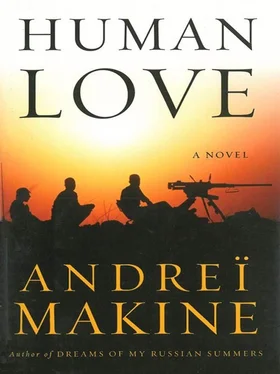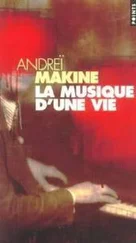These questions seemed to him childish and even foolish, and yet they disturbed the rigor of the theories he was learning at the university. An old woman, walking slowly on the day of the first snow, leans on a branch, looks up toward the flurry of snowflakes… Impossible to find a place for this human being in the propaganda trio one saw everywhere on the facades of buildings in Moscow: a worker with muscular arms, a kolkhoznik laden with sheaves of wheat, a bespectacled intellectual with his scientific instruments. These three classes symbolized the present and the future of the country. The old woman was not of their time. Like so many others in this country thought Elias. A whole stratum of life was excluded from the philosophers’ fine systems.
From that day onward he traveled a lot on foot, in the hope of discovering behind the facades a world peopled by these unclassifiable human beings who challenged Marx.
One of these strolls on the outskirts of Moscow nearly cost him dearly. He was walking that evening through the heart of an outer suburb where dreary prefabricated dwellings stood cheek by jowl with old wooden houses and structures from the postwar years, those long, single-story erections where in Stalin’s day they deposited the workmen recruited for the reconstruction of Moscow. Occasionally a dark brick wall would rear up, concealing the blackened buildings of a factory. Whether alone or in groups, people walked quickly and in silence, as if to get away from the area.
Elias was familiar with the different reactions his face provoked. Often a discreet but hostile curiosity, a quick, astonished glance: What’s that negro doing here? Some people, especially the young, had no hesitation in saying it. Occasionally, on the other hand, a broad smile that ought to signify tolerance and hospitality, the ploy he feared the most. Rarely simple indifference, which he preferred. But that evening the snow was falling copiously and under the cover of this moving curtain his progress attracted very little attention. His pace was matched by an apparently very simple train of thought: What I can see Is the outcome, admittedly only provisional, of three revolutions, several wars, and the work of two hundred million men and women who for over half a century have been building a new world, in accordance with a grand plan, the dream of humanity…
He did not notice at what moment the lane he was following began to run alongside a snow-covered railroad track, then dipped beneath the crumbling roof of a kind of train depot. He stopped, attempted to retrace his footsteps, and realized that it was already too late to escape.
“Shit! I guess they forgot to shut the cages at the zoo. Look, there’s a monkey! Any minute now well see a giraffe!” Elias met the eye of the man who had just spoken. Then all the men, seated in a semicircle, howled with laughter. They were sitting around a metal stove, whose open top belched out flames and acrid, purplish smoke. One of them withdrew a slender iron spike from the fire and plunged it into a bucket. The hissing of the steam mingled with the last of the guffaws.
“So where did you spring from, sunshine? You climb down out of your tree. You learn to walk. And, fuck me, on your first time out you come round to our place. Well, thanks a lot, you stupid fucker. You Ve made our day…” The men laughed again; the one who had put the spike in the water did an imitation of a monkey jumping out of a tree, starting to hobble along on three legs and scratching the back of his neck with his fourth. Elias tried to back away but, looking round, he saw one of them behind him holding a strip of heated metal, clasped between leather mittens, with a glowing tip that appeared transparent. No threatening gestures, just scorn, almost casual.
This was not one of those little gangs of youths Elias had so far contrived to avoid. These were older men, he noted, caught off guard themselves by his appearance and seeking to divert attention from whatever they were up to through mockery. “You can get the hell out of here now, Mr. Ape. And well have your shapka . You won’t need it in Africa. Go on. Fuck off! Move it! The zoo shuts in an hour…” A hand reached out toward his head. Elias pushed it away, and at once a rapid blow from an iron rod knocked off his shapka . There was a perceptible smell of burning. He spun round and saw a wisp of smoke rising from the bottom of his coat.
“Go on, piss off! Don’t you understand human language? Or do you want to be incinerated?” A white-hot spike began waving around in front of his face.
“I need my shapka … It’s snowing… And as for language, you’re talking like those bastard slave drivers who…”
Several men got up. “Okay, so you don’t want to get out of here on two legs like everyone else. Fair enough. You can go home on all fours like an ape…”
He was able to parry the first blows but suddenly felt a sharp burning on the back of his neck, could not repress a cry of pain, was thrown to the ground, dragged outside. A heavy boot kicked him in the head; his vision clouded over. He came to very quickly tried to pick himself up, but was thrust back into a snowdrift. His cheek was pressing against the snow, and this cold seemed salutary to him. With one hand he picked up a handful of ice, clamped it against his burning neck.
A kind of indifference overcame him. The physical pain was nothing beside the abyss that had just opened up within him. After three revolutions, several wars, over half a century of striving… The dream of humanity…, a faint echo reverberated in his head.
Even the words now ringing out above his body in the darkness seemed of no interest to him at first. And if they finally intrigued him, it was because he could hardly understand a thing. And yet it was Russian. Not the foul-mouthed Russian often spoken in the streets of Moscow, whose smutty coarseness was familiar to him. No, a language whose rhythms he could make out very well, but whose words were quite unknown. Then he turned his head, trying to see whoever it was uttering these brief delphic sentences.
To the left of his face he saw a woman’s shoes, of a heavy and ugly design, their leather all worn. Then coarse cotton stockings and the side of a dark coat made of rough woollen cloth. He pictured an elderly woman; the voice matched these clothes and that age, a dull, rather harsh voice. The old woman I saw on the day of the first snow, he suddenly thought, and strangely, this harebrained notion reassured him.
He heard the crunch of the snow beneath retreating footfalls, then felt a hand touching his head, his cheek. “You can get up now. They Ve gone…”
He sat up and then, gritting his teeth to suppress a groan, rose to his feet. And remained on the spot for a long while, teetering slightly, not collapsing, thanks to the gaze that rested on him and sustained him. At that moment neither the woman’s beauty nor her youth struck him. No word of gratitude formed in his head. There was this silence, the swirling of snow, and a face that seemed to have been traced in the darkness by the incessant fluttering of the crystalline flakes.
He would later come to grasp that this was a beauty of an unusually high order. Others would speak of it to him, sometimes enviously, sometimes with regret: a gift from heaven too rich for a young woman from the provinces. And he would feel incapable of explaining that for him what was beautiful, too, was the touching ugliness of the battered shoes she wore that evening, and the muted music of their footfalls on a snow-covered road, and the resinous smell of the railroad in the icy air…
Throughout his life he would have the impression that he could recall every minute ever spent with her, every twist and turn of the streets they followed together, every fleeting cloud shape above their heads. And yet in the moments closest to death, and therefore the most real, this would be the instant that came back to him, with the patient sorrow of his love: the sharp fragrance of snow, the stillness of a particular dusk, and those eyes that had kept him upright.
Читать дальше









